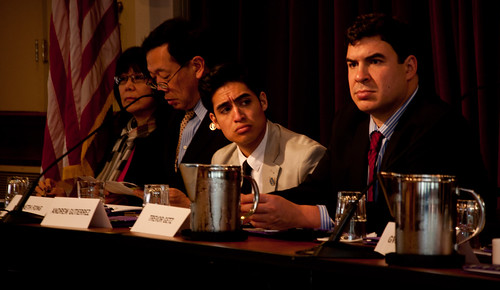
The only opportunity for students, administration and faculty to directly express their opinions on SF State’s presidential selection with the CSU Board of Trustees was met with snide remarks, high expectations, unanswered questions and disproportionately low attendance.
Only about 15 people spoke during public comment in a crowd of approximately 70, a majority of them administration and faculty, in the Seven Hills Conference center Feb. 20. Currently, this was the only open meeting slated to take place during the selection process.
“Thank you for giving me the opportunity to speak before you leave in your luxury cars and get chauffeured to your next destination,” said Lalo Gonzalez, 23, a criminal justice major. “My question is, how do you expect the next president to actually fight for the students and the current fees, and not become another puppet in the current system?”
The committee did not answer him, but asked for other input in relation to the SF State campus and its involvement in San Francisco and the greater Bay Area.
While a lot of focus was spent on the board’s decision-making process, Roberta Achtenberg, CSU trustee and committee chair, noted that faculty, staff and student input will be taken alongside committee members in what they would like to see in the next president.
“You (the audience) can be skeptical,” said Achtenberg. “I believe these committee members will attest that they were free to exercise their judgements.”
Administration and faculty in attendance stressed the importance of having a president interested in research initiatives, diversity awareness and community involvement.
“Within our mission of teaching, we also need a president who is a big supporter of research for our faculty. We don’t want our faculty teaching what they learned in graduate school 10, 20 years ago,” Sheldon Axler, dean of the College of Science and Engineering and member of the University research council said. “They need to be teaching cutting-edge material, and particularly in science and engineering. The faculty member who hasn’t learned anything new in five or 10 years is completely out-of-date and not bringing to our students the things they need to know.”
Philosophy Chair Anita Silvers said that the next president should be focused in maintaining SF State’s international presence.
“It is very important for this campus’ health for us to have a national and international profile and a president who understands that we have that capacity,” said Silvers, who was a chair of the Senate during the presidential search that elected Corrigan. “We have students all over the world right now—I can never tell where my students are from in any semester.”
During the forum, CSU Chancellor Charles Reed discussed the issue of asking potential candidates to come to campus before finalizing their bid for president. He said that every candidate will visit the campus, in order to get a feel for the campus. In previous searches, candidates went incognito to campuses, because they have been unwilling to identify themselves to protect their relationships and future at their current institutions.
“Later on in this process is where I think this advisory committee needs to make that decision,” Reed said. “If they are doing a really good job, have a good relationship with their board and their chancellor, then it’s putting their future in jeopardy. The reason is, if you have three (final candidates) only one of them can get the job and then the other two are doing damage control.”
Philosophy major Terence Yancey explained that he has no interest in a presidential candidate who is from the corporate world or afraid to show themselves to their potential new campus.
“As far as the confidentially, if the candidate for president is not proud to say that they are a candidate for San Francisco State University, does not want to be here above all else, and is not willing to say this is their first choice and put everything else to the side, then personally, I don’t want them as my president,” he said. “I want the person who’s here to want to be here above all else.”
Although the committee prepared for a large turnout with three overflow rooms, limited publicity of the event contributed to poor attendance; only a handful of students were present. Prior to the forum, the only publicity of the event included two tweets from the SF State news page, a campus memo, which is sent to faculty and staff, and a press release on the SF State website issued Feb 7.
As the sole student voice of the advisory committee, Andrew Gutierrez III, president of Associated Students, Inc., mentioned that the publicity of the event was deliberately minimal after a decision by the administration, due in part to fears of a demonstration that could jeopardize future presidential visits.
“They (the advisory committee) were concerned about a student demonstration at the meeting,” Gutierrez said prior to the start of the meeting.
Nicole Henderson, SF State alumna and administrative coordinator of the academic senate, would like to see more staff and students working collectively to send and receive important information such as the open presidential meeting.
Henderson believes that the lack of student attendance at the meeting is not only the fault of the SF State administration, but the students themselves.
“We have the student body president sitting on the committee,” said Henderson, 28. “When do the students of San Francisco State University take responsibility? I could have told five people, but there could be a poster in front of your face and you could still not attend.”
According to Achtenberg, the advisory committee has already received recommendations for the president, but no selections have been made yet. A review of applications is the next step, which will be accepted until March 16, followed by resume reviews in a closed meeting on March 23.



